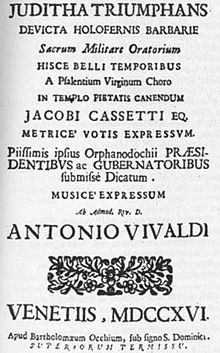Juditha triumphans
Juditha triumphans devicta Holofernis barbarie (literally: " Judith triumphing over the barbarism of Holofernes ", RV 644) is an oratorio by Antonio Vivaldi , the only surviving of the four oratorios he composed. The libretto is by Iacopo Cassetti and deals with the subject of the biblical book Judith .
background
Juditha triumphans was composed in Venice in November 1716 and premiered by the orchestra and choir of the Ospedale della Pietà . The work was commissioned by the Republic of Venice to celebrate the victory against the Turks in the siege of Corfu in the same year. In July 1716 the Turks landed on Corfu. The population resisted, and in August Venice signed an alliance with the Holy Roman Empire . On August 18, the decisive battle was won under the leadership of Count Johann Matthias von der Schulenburg , and the Turks left the island. The story of Judith, who defeated the general Holofernes, who besieged her city, should therefore be seen as an allegory of the Venetians who were victorious over the Turks.
Juditha Triumphans was premiered in November in the Pietà in the presence of General von der Schulenburg and was a great success.
occupation
All roles were sung by the girls of the Pietà at the premiere .
- Juditha , Kontralto , a young Bethul widow
- Vagaus , soprano , eunuch, Holofernes' squire
- Holofernes , contralto, Assyrian general
- Abra , soprano, Juditha's maid
- Ozias , Kontralto, high priest of Bethulien
A women's choir sings the roles of the Assyrian soldiers and the Bethul women.
The string orchestra is reinforced in the original line-up by Timpani , 2 trumpets , mandolin , 4 theorbs , 5 "viole all'inglese" ( Viole da gamba ), 1 viola d'amore , 2 recorders , 2 soprano chalumeaus , 2 oboes and an organ .
action
The Assyrian King Nebuchadnezzar sends an army under General Holofernes to Israel to collect overdue tributes. The Assyrians lay siege to the city of Bethulia and are on their way to conquer it. The young Jewish widow Judith goes to him to implore mercy. He falls in love with her and she gives in to his insistence. After a plentiful meal and a lot of wine, Holofernes falls asleep. Judith cuts off his head and returns to Bethulien in triumph.
Individual evidence
- ↑ Baroque Music As far as his theatrical activities were concerned, the end of 1716 was a high point for Vivaldi. In November, he managed to have the Ospedale della Pietà perform his first great oratorio, Juditha Triumphans devicta Holofernis barbaric [sic] . This work was an allegorical description of the victory of the Venetians (the Christians) over the Turks (the barbarians) in August 1716.
literature
- Gianfranco Formichetti: Venezia e il prete col violino. Vita di Antonio Vivaldi , Bompiani 2006, ISBN 88-452-5640-5 .
- Michael Talbot : Antonio Vivaldi , Insel Verlag , Frankfurt am Main 1998, ISBN 3-458-33917-5 .
